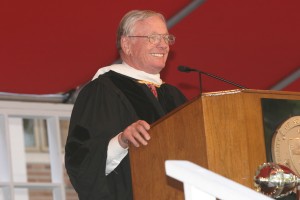Alumnus, astronaut Armstrong dies at 82
Neil Armstrong, who became an American icon as the first man to set foot on the moon, died Saturday, weeks after heart surgery. He was 82.

Advice · Neil Armstrong spoke to graduates about the importance of strong moral principles in his 2005 commencement address at USC. – Photo by Lee Salem
The former astronaut underwent cardiac bypass surgery earlier this month, just two days following his birthday.
Armstrong, who attended USC for graduate school, was the commander of Apollo 11 when he planted the American flag on the moon’s soil July 20, 1969.
“That’s one step for [a] man, one giant leap for mankind,” he famously radioed back to Earth.
In 1970, Armstrong received a master of science in aerospace engineering. Though Armstrong was a few units short of graduating, Richard Kaplan, an aerospace professor at the time, recalls the university awarding him directed research credit for walking on the moon.
“It made it really hard for the next guy who did directed research,” Kaplan said. “Where was he going to walk?”
In addition to his professional achievements, Armstrong was remembered for exemplary character, including his humility and dedication to public service.
“Honor his example of service, accomplishment and modesty, and the next time you walk outside on a clear night and see the moon smiling down at you, think of Neil Armstrong and give him a wink,” his family said in a statement released Sunday.
Though Armstrong did not remain involved with the university after he graduated, he came back in 2005 to deliver a commencement speech in which he urged graduates to develop strong values and principles of their own.
“You can lose your health to illness or accident,” he said. “You can lose your wealth to all manner of unpredictable sources. What are not easily stolen from you without your cooperation are your principles and your values. They are your most important possessions and, if carefully selected and nurtured, will well serve you and your fellow man.”
Kaplan said both Armstrong and Apollo 11 crewmember Buzz Aldrin were aware of their mission’s significance and changed by it.
“They were both very dignified and thoughtful people,” Kaplan said. “It was something in their life that I think made them much more introspective.”
Neil Alden Armstrong was born on Aug. 5, 1930 in Wapakoneta, Ohio. In 1947, Armstrong enrolled at Purdue University as an aeronautical engineering student on a Navy scholarship. Two years later, he interrupted his studies to serve as a pilot in the Korean War, flying 78 combat missions.
Armstrong first enrolled at USC in 1955, according to assistant registrar James Feigert. He took courses through the university’s aerospace program at Edwards Air Force Base.
After landing on the moon, Armstrong continued working at NASA as deputy associate director for aeronautics until 1971. He later taught at the University of Cincinnati as a professor of aerospace engineering and became the chairman of computing technologies for Aviation, Inc.
Yannis Yortsos, dean of the Viterbi School of Engineering, said Armstrong is an alumnus who should inspire students to think innovatively.
“When you look back, you want the same type of spirit to be rejuvenated today and to help people imagine in the same direction as people imagined [then],” Yortsos said.
Kaplan said Armstrong’s passing reflects the passing of an era.
“We did so many wonderful things in those days and when the heroes of those times are gone you wonder who is going to replace them,” Kaplan said.
A private service is planned in Cincinnati on Friday.
